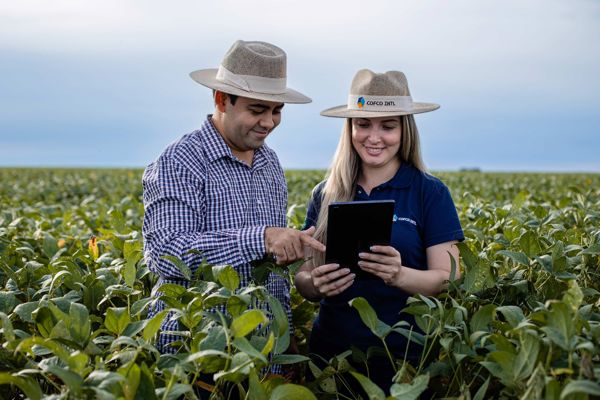
COFCO around the world: Ukraine - a solid partnership with potential to grow
Situated on the left bank of Ukraine’s Bugskiy Liman estuary where the Yuzhniy Bug and Inhul rivers join up before flowing into the Black Sea, Nikolaev Port never goes to sleep.
Every hour of every day, ships dock, trucks arrive and powerful gantry cranes help to load and unload heavy vessels. From here Ukraine’s seeds, grains and other goods sail on bulk carriers to pretty much every corner of the world. Amidst the bustle, dozens of languages can be heard, revealing the global nature of this port, which was originally built for navy repairs before opening as a commercial harbor in 1862.
Nearly 160 years later, Nikolaev Port is the beating heart of COFCO International’s operations in Ukraine. Arriving from farms and silos as far as 500km away, sunflower oil and meal, wheat, barley, corn and other food commodities are shipped by the company to places near and far - Europe, Africa, Middle East, and around Asia.
The decision to build the terminal was made in 2014, at a time of growing political uncertainty. It was successfully executed less than two years later. Marcelo Martins, a member of COFCO International’s Executive Team who oversees operations in Europe, Middle-East, Africa, Asia and the Black Sea region, says it was a sign of the company’s strong commitment to Ukraine, an agricultural powerhouse and one of the biggest grain producers in the world.
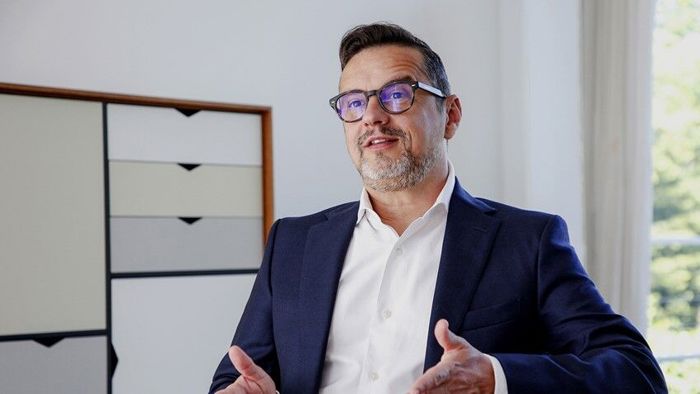
Marcelo Martins, Vice President and Head of Grains & Oilseeds at COFCO International
“As one of the largest food producers in the world, Ukraine is a strategically important location for our company,” he says. “We have made a decision to increase our presence here as we strongly believe in its potential.””
– Marcelo Martins
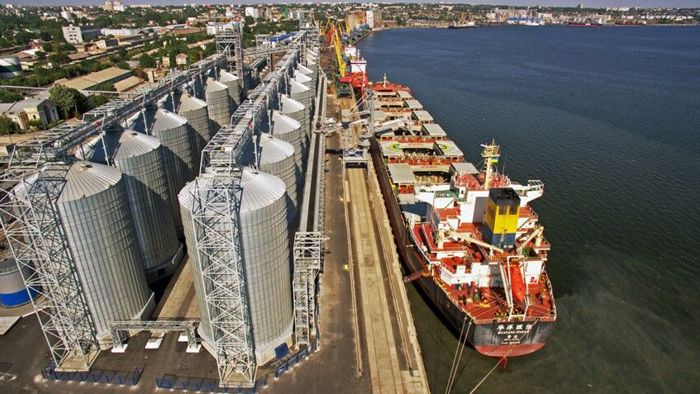
COFCO International DSSC Terminal at Nikolaev Port
Unexplored future
There are many factors that elevate Ukraine on the global commodities map. Vast steppe-like zones, a moderate climate, and a geostrategic position linking Europe with Asia and the rest of the world. Apart from the overland routes, Ukraine’s access to the Black Sea connects it with the Mediterranean through the Bosporus, and the Red Sea via the Suez Canal. The country’s main food commodities exports include corn, wheat, barley, sunflower oil and meal, rapeseeds and soy beans.
COFCO International has entered the market in 2014 as a result of its acquisition of Noble which had a 583 people-strong operation with 6 locations in the country.
COFCO International presence in Ukraine
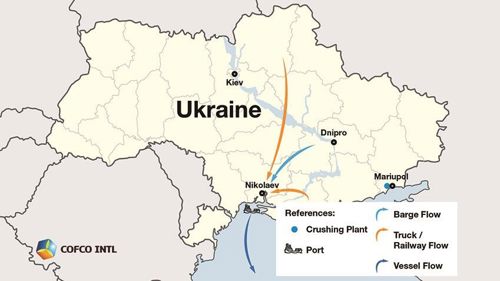
Today, it has seven strategic locations that include a crushing plant, four grain silos spread east and west along the country’s Dnieper river as well as a commercial office in Kiev.
Commodity flow and business chain
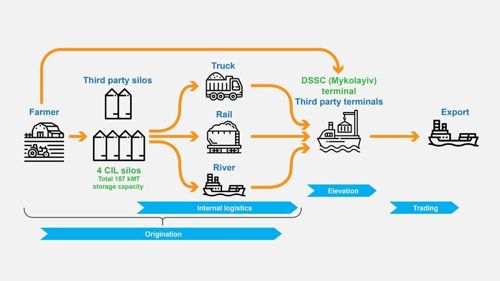
Once the breadbasket for the Soviet Union, Ukraine’s food commodities sector is growing again and it remains a key location for commodities players from around the world.
According to Martins, Ukraine - already COFCO International’s third largest operation after Brazil and Argentina - still has lots of room for growth.
“For us the key element is Ukraine’s big potential for growth which we expect to take place thanks to increased productivity and efficiency.”
An extensive plan to restructure land ownership, the prospect of more public and private investments alike, and a steadily improving infrastructure will all reward the country and investors, he says. Ukraine is also a strategic location for China’s Belt and Road Initiative, an ambitious plan to improve trade routes around the world, connecting as many as 70 countries.
“We consider Ukraine to be one of our key areas for expansion,” Martins says. “We believe in its potential, its ability to deliver higher production, expanding acreage and better logistics.”
Transition
Vladimir Osadchuk, COFCO International’s country manager in Ukraine, says the country is still in the process of shifting its agriculture away from the Soviet period when the farming landscape was dominated by so-called kolkhozes, collective farms on state-owned land and productivity was crippled by a complex web of bureaucracy and central control.

Vladimir Osadchuk, COFCO International’s country manager in Ukraine
Today, Osadchuk says, the country is still untangling these structures to allow private businesses and people to benefit from the land.
“We are still in the process of transition,” he says from the Kiev office. “Moving away from this very inefficient set-up to a market-led system that generates profit, prosperity and growth for the whole country takes a lot of time, money and effort.”
Today the main obstacles to this growth are the very mixed road conditions, complex land ownership laws, and recurring political uncertainty.
Despite that, COFCO is investing more widely in the country. It is cooperating with local governments and city authorities to improve infrastructure and transportation routes around its assets. It also added a new grain silo in Talalaivka, a village in the northern Chernihiv region.
With a team of nearly 700 people spread strategically around the country, the company is well placed to cement its position and build strong relationships with local farmers and suppliers.
“There is still a long way to go before Ukraine reaches its full potential,” Martins says. “But we are committed to be part of that journey.”
